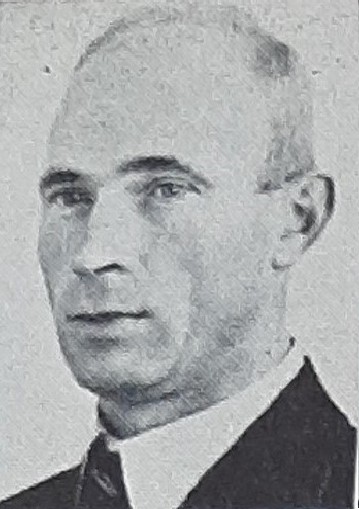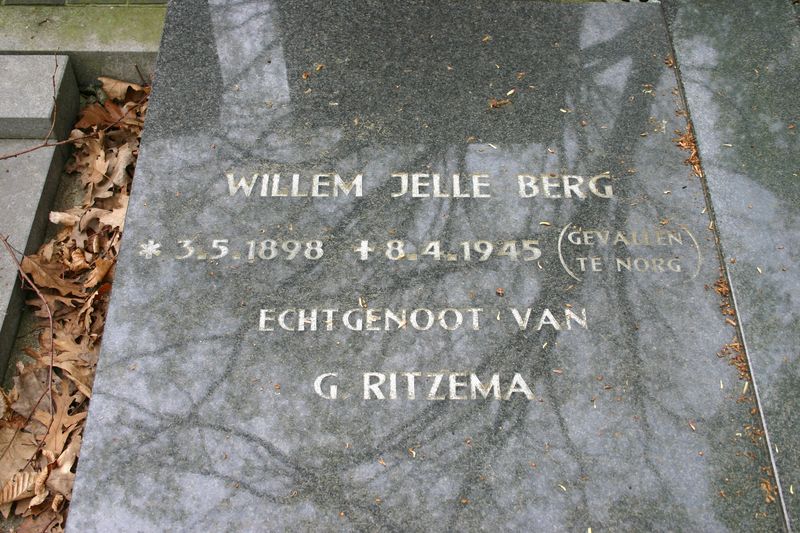Berg, Willem Jelle
- Date of birth:
- May 3rd, 1898 (Sappemeer, the Netherlands)
- Date of death:
- April 8th, 1945 (Norg, the Netherlands)
- Buried on:
- Dutch War Graves Koepelkerk
Row: 3. Grave: N. - Nationality:
- Dutch
Biography
Willem Jelle Berg was born in Borgercompagnie on the farm "Willemshoeve" as the son of Willem Berg and Martha Medema. After his studies he went to work on the parental farm, which he would later take over.
On May 3, 1924 he married Geertruida Ritzema. Nine children were born from the marriage.
When our country became involved in the Second World War, the consequences were also noticeable in Hoogezand and Sappemeer. Willem Berg, a jovial man who was always prepared to do something for others, could not tolerate injustice. With that attitude he became involved in resistance work, in illegality. He distributed illegal leaflets such as Vrij Nederland and Trouw, helped people in hiding find a place to stay on his own farm, where they worked as so-called volunteers or took them in with others. In addition, he helped people who had people in hiding in their homes with ration cards, money and food, such as milk from his own company. He clearly did not adhere to the rules imposed by the occupier. He knew what he was doing and the risks involved. He also knew that there were people around him who were "wrong", but he still dared to speak his mind openly. People took this from him.
About 100 metres from Willem Berg's farm, the L. Meijer family lived at the time. They say that three refugees once arrived in Borgercompagnie. In the vicinity of Scheemda, they had jumped off the train from Westerbork to Germany. They ended up with the Berg family. There was always room at Berg's. Mr. Meijer: "At that time, there was already a food shortage. Food was no longer available everywhere. Berg would then go to Scheemda with a horse and cart and fill his cart with grain. Beet leaves were placed on top of that so that it would not be noticeable that he was transporting grain. He helped the people with that. There were larger grain companies in Oldambt". Mrs. Meijer says: "Once there was a raid on the Berg family. From our box bed we saw the military vehicles driving past to their farm. They were raided three times. The last time they took Willem Berg and later shot him dead. Terrible!"
Willem Berg was asked by the Dutch Resistance to help lead the temporary military authority in Sappemeer after the liberation. He would help organize an order service to prevent a "day of reckoning" from taking place, when the people would take revenge on the NSB members and collaborators. Berg also had to prevent people who had always stood on the sidelines and kept aloof from setting themselves up as resistance fighters after the war. Berg was mild in his statements about NSB members. He distinguished between the followers and the real traitors, who had had people taken away to the camps. "He thought you couldn't lump them all together," a family member said. "The latter group, he thought, should be punished more severely than the followers. Standing up for people who were oppressed and persecuted was a very decisive principled choice for him".
Because of the risk that Willem Berg could be betrayed or arrested during a raid, he often slept somewhere else. In the garden in the chicken coop, at the back of the land or at someone else's. Then he still had a chance to get away. The people in hiding on the farm slept between the piled up hay or grain in the barn, at the back of the cornfield and even in a large empty water trough above the horses. The latter only in very great danger because of the strong ammonia stench in the stable.
April 1, 1945: Another raid at the Berg family. Early in the morning, before 7 o'clock. Military vehicles stop in front of the farm. It is the notorious S.D. group of Lehnhoff from the Scholtenhuis in Groningen. The farm is surrounded. After a short interrogation, they take Willem Berg to the headquarters of the S.D. in Groningen. He is held there for a week. Then he is taken away together with a large group, thirty men, all fiercely anti-German, were taken to the woods of Norg. The family would never see Willem Jelle Berg alive again. A horrible drama took place in those woods on 8 April 1945. While the end of the war was in sight and the French had already landed in the area, the 30 people, including Willem Berg, were shot dead in reprisal.
Willem Berg did not want to accept the fate that he would be shot in the woods. He most likely made another attempt to escape his death. He was probably shot dead during that attempt.
When the mass grave in Norg was discovered, holes were found in Willem Berg's jacket and body, probably from a hunting rifle. The others had all been shot in the neck. Willem Berg fought and resisted until the end.
His remains were transferred to Sappemeer and were buried there on 16 April, 3 days
Do you have more information about this person? Inform us!
Sources
- Photo 1: J.Niemeijer "Hoe Groningen streed".
- Photo 2: Bert Deelman
- - Willem Jelle Berg | Oorlogsgravenstichting
- Willem Jelle Berg (Sappemeer (gr), 3 mei 1898 - Norg (dr)/Bonhagen, 8 april 1945) - Netwerk Oorlogsbronnen
- Willem Jelle Berg | Erelijst van Gevallenen 1940-1945
- Gezinskaart van Willem Jelle Berg (1895-1945) – Greets genealogie
- Het Nieuwsblad. 10 januari 1991. Pagina 3



